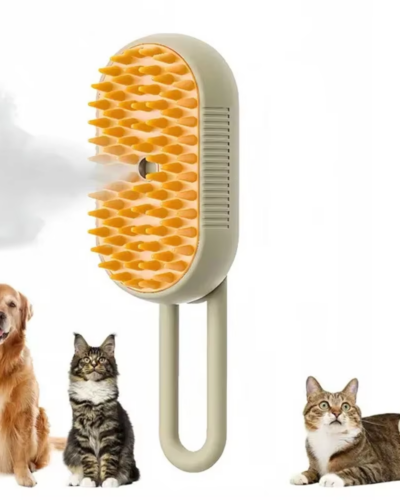Free delivery for orders over £45
Healing Paws: How Cats and Dogs Help Us Combat Anxiety and Depression

“When I come home after a stressful day, my cat is always there, purring and rubbing against my leg.
It’s like all my worries melt away.”
This quote from a pet owner highlights the profound impact pets can have on our mental health.
Cats and dogs, with their unconditional love and companionship, offer more than just a warm presence—they can be powerful allies in combating anxiety and depression.
In this article, we will explore how our furry friends help alleviate mental health struggles, share personal stories of healing, and provide practical tips for maximizing the benefits of pet companionship.
1: The Therapeutic Benefits of Pets
Understanding the bond between humans and pets can shed light on how they help combat anxiety and depression.
Research shows that interacting with pets can increase levels of oxytocin, a hormone associated with bonding and stress relief.
Moreover, petting animals has been found to lower cortisol levels, a primary stress hormone.
According to a study by the Human-Animal Bond Research Institute (HABRI), 74% of pet owners reported mental health improvements from pet ownership.
Dr. Alan Beck, director of the Center for the Human-Animal Bond at Purdue University, states, “Pets provide a non-judgmental presence and unconditional love, which can be especially comforting during times of stress.”
2: Personal Stories of Healing
Many individuals have found solace in the company of their pets. Take Sarah, for example, who struggled with severe anxiety.
“I was often paralyzed by fear and could barely leave my house.
Then I adopted Bella, a rescue dog.
Her joyful spirit and need for daily walks forced me to go outside.
Over time, my anxiety lessened, and I started feeling more confident.”
Similarly, Mark, who battles depression, shares, “My cat, Whiskers, seems to know when I’m feeling low. She’ll sit on my lap, purring contentedly, and it feels like she’s absorbing my sadness.”
These stories exemplify the powerful emotional support pets provide.
3: The Role of Cats in Mental Health
Cats, with their calm and independent nature, can be excellent companions for those suffering from anxiety and depression.
Their soothing purrs are not only comforting but have been shown to have therapeutic effects, such as reducing stress and lowering blood pressure.
Cats also express affection through head-butting, slow blinking, and sitting close to their owners.
Emma, a cat owner, recounts, “Whenever I’m overwhelmed, my cat Luna will climb onto my chest and purr softly.
It’s like she’s reminding me that I’m not alone.”
These small yet significant gestures can provide immense comfort to those struggling with mental health issues.
4: The Role of Dogs in Mental Health
Dogs, known for their loyalty and enthusiasm, offer unique mental health benefits.
They encourage physical activity through regular walks, which can help reduce symptoms of depression.
Additionally, the routine of caring for a dog provides structure and a sense of purpose.
“Having Max, my Golden Retriever, has been life-changing,” says Jake, who deals with chronic depression.
“His boundless energy and need for walks have made me more active.
Plus, his happy demeanor is contagious.”
Dogs also express their love through wagging tails, licking, and leaning into their owners, creating a strong emotional bond that can be incredibly healing.
5: Practical Tips for Maximizing the Mental Health Benefits of Pets
To fully benefit from the companionship of pets, consider these practical tips:
- Regular Exercise: Engage in daily walks or play sessions with your dog. For cats, interactive toys can stimulate physical activity.
- Consistent Routines: Maintain a regular schedule for feeding, playing, and grooming to provide stability and structure.
- Positive Interactions: Spend quality time with your pets, whether it’s cuddling, talking, or simply being present.
- Understanding Behavior: Learn to recognize and respond to your pet’s affectionate gestures, such as purring, tail wagging, or head-butting.
6: Challenges and Considerations
While pets can greatly aid mental health, there are challenges to consider.
Time commitment and potential behavior issues can be stressful.
It’s important to set realistic expectations and seek help when needed.
For instance, training classes can address behavioral problems, and pet sitters can assist during busy periods.
Dr. Katherine Houpt, an animal behaviorist, advises, “Understanding your pet’s needs and behaviors is crucial. It’s a two-way relationship that requires patience and effort.”
Conclusion:
Pets provide more than companionship; they offer emotional support that can help combat anxiety and depression.
By understanding their love languages and integrating them into our daily lives, we can strengthen the bond and reap the mental health benefits.
As you cherish the healing paws in your life, remember that their affection is a powerful tool in your journey towards well-being.
Share your experiences and tips in the comments section, and let’s celebrate the incredible ways our pets enrich our lives.
Contact Us
- +44 07391626201
- info@promotepet.com
- 16, Cromwell Close - Oxford - UK
COPYRIGHT © PROMOTE PET. ALL RIGHTS RESERVED. © 2024 Chofard Enterprise Ltd. Chofard Enterprise is a company registered in England and Wales with a company number 13073779 VAT number GB 370644889. 16, Cromwell Close, Oxford OX30RW, United Kingdom – trading as Promote Pet Online Shop.








